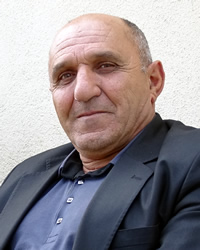The Mountain Jews are also known as Caucasus Jews or Persian Jews. They originally were taken to Persia from Israel following the destruction of Solomon's Temple, in 587 BC when they were conquered by the Assyrians. Over 2,000 years ago they faced ongoing persecution in Persia. This forced them to migrate to Azerbaijan where they adopted the Muslim Tat language. Using the Tat language, they developed what became a distinct Jewish dialect called Judeo-Tat or Judeo-Persian. Many of them became farmers and peacefully lived in the small, isolated villages located close to the Black and Caspian Seas. Living in their remote villages allowed them to maintain their Jewish culture and religious beliefs according to the teaching found in the Jewish scriptures of the Old Testament. The effect of 70 years of communist rule deeply effective the traditional Jewish life of the Mountain Jews. They no longer followed their religion in regard to reading Jewish literature, attending the synagogue or celebrating Jewish Holidays. Many Mountain Jews began to leave Azerbaijan for Israel after the fall of communism. Only in recent years have Jewish rabbis from Israel revived the tenets of Judaism for these people. This included special classes in Hebrew, Jewish studies of the Torah, reopening of several synagogues and helping those who were leaving Azerbaijan to settle in Israel. Since April 1992, Israel and Azerbaijan have maintained strong bilateral relations, making the Asian country one of only a handful of Muslim-majority countries that have diplomatic relations with the Jewish State. Azerbaijan is Israel's top oil supplier as of 2014, providing about 40% of the crude oil for Israel.
A number of the Mountain Jews in Israel are farmers. This has been their occupation for generations. They are experts in the growing of grains, vegetables, tobacco, grapes and raising silkworms. Some make wine from their grapes and a few raise animals. Women are known for weaving beautiful rugs. Israel has made it possible for the younger Mountain Jews to receive an education so they can advance in jobs related to computer science and business. Migrating to Israel made it possible for them to have more opportunities to practice their Jewish traditions and religion; however, many are secular and identify only culturally as Jewish. They love their dances, music and a few work in the entertainment industry of Israel. They have assimilated into life in Israel at the same time maintaining their identify as Caucasian Jews. Family and friends mean a great deal to the Mountain Jews.
Israeli Mountain Jews follow Jewish traditions which are infused with ancient Jewish mysticism. Esoteric Kabbala contains the secret knowledge of the unwritten Torah (divine revelation) that was communicated by God to Moses and Adam. Kabbala provided a means of approaching God directly. It gave Judaism a religious dimension whose mystical approaches to God were viewed by some as dangerously pantheistic and heretical. The earliest roots of Kabbala began to flourish in Israel in the 1st century AD. The earliest known Jewish text on magic and cosmology was, "The Jewish book of Creation," which first appeared sometime between the 3rd and 6th century. It explained creation as a process involving the 10 divine numbers of God the Creator and the 22 letters of the Hebrew alphabet. Joined together, they believe this contains the "32 paths of secret wisdom. " Historically, Mountain Jews have always had a rabbi and a Dayan to carry out the spiritual duties in their synagogues. The rabbi performs the duties in the synagogues and the teaching of the Jewish text as given in the Old Testament. A Dayan was the chief rabbi of a town who presided over the Beit din (house of judgement) or court. In ancient times, it was the building block of the legal system in the Biblical Land of Israel. Today, it is invested with legal powers in a number of religious matters specifically related to Jewish religious life. Being in Israel has enhanced the spiritual lives of many Israeli Mountain Jews. However, a large number are secular and tend to place more importance on jobs and family.
Resistance to outreach has closed the Mountain Jews off from being willing to listen to the gospel. They need caring and patient Christ followers to befriend them so they will be open to hearing how Jesus the Messiah will change their lives for eternity.
Pray for a spiritual hunger among the many Jewish Tats who view their "Jewishness" as an ethnic identity with little spiritual substance. Pray that Mountain Jewish people will be willing to view the JESUS Film and listen to Bible Broadcasts in Israel. Pray that God will work on the hearts of Christians and Jewish believers to establish friendships with these Mountain Jewish people in Israel. Pray that they understand that if they come to accept Jesus it will not change Jewish identity.
Scripture Prayers for the Jewish Tat, Mountain Jewish in Israel.
| Profile Source: Joshua Project |










